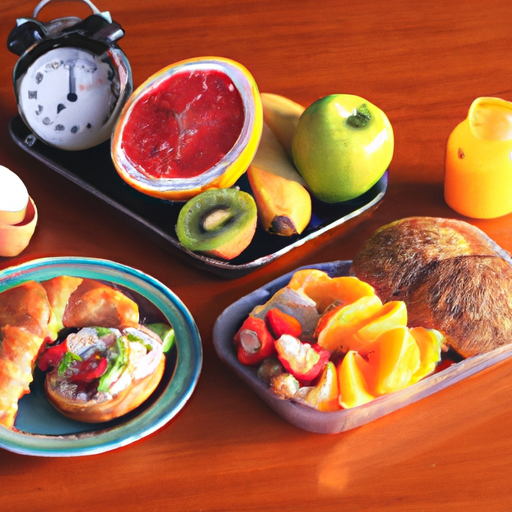Last Updated on June 13, 2024 by Rikki
In a recent study conducted by American scientists, researchers discovered that a person’s diet could potentially help prevent the symptoms of jet lag. Jet lag occurs when your internal body clock is out of sync with the local time, causing feelings of fatigue and disorientation.
By studying the interactions between various internal clocks within the body, the scientists found that eating a substantial meal in the morning in the new time zone can aid in adjusting to the time difference and reduce the effects of jet lag.
This research opens up possibilities for developing recommendations to combat jet lag and enhance the acclimatization process.
Overview
In this article, we will explore the topic of jet lag and how it affects our bodies. Jet lag is a common problem that many travelers experience when they cross multiple time zones in a short period of time.
We will discuss the role of circadian rhythms in jet lag, as well as the impact of food and meal timing on this condition. Additionally, we will explore specific foods that can help alleviate jet lag symptoms and provide meal-planning strategies for travelers.
Finally, we will discuss other strategies such as light exposure, exercise, hydration, and avoidance of alcohol and caffeine to reduce jet lag.
By the end of this article, you will have a comprehensive understanding of jet lag and how to minimize its effects.
What is Jet Lag?
Jet lag is a temporary condition that occurs when our internal body clocks, known as circadian rhythms, are disrupted. It typically happens when we travel across multiple time zones in a short period of time, causing our internal clocks to be out of sync with the local time at our destination.
This disconnect between our internal rhythms and the external environment can result in various symptoms such as fatigue, sleep disturbances, loss of appetite, and difficulty concentrating.
The Role of Circadian Rhythms
Understanding Circadian Rhythms
Circadian rhythms are the natural, internal processes that regulate our sleep-wake cycle, hormone production, body temperature, and other bodily functions. These rhythms follow a 24-hour cycle and are influenced by external cues, most notably light and darkness. Our internal clocks help us maintain a sense of time and regularity in our daily lives.
How Circadian Rhythms Affect Jet Lag
When we travel across time zones, our circadian rhythms become disrupted because they are no longer synchronized with the new local time at our destination. This disruption can lead to symptoms of jet lag such as insomnia, daytime sleepiness, digestive issues, and general malaise. It usually takes a few days for our internal clocks to adjust to the new time zone and for the symptoms to subside.
The Impact of Food
The Connection Between Food and Jet Lag
Studies have shown that the timing and composition of our meals can have a significant impact on how our bodies adjust to new time zones and alleviate the symptoms of jet lag.
Food acts as a powerful synchronizer for our internal clocks, providing signals to various parts of our body that help regulate circadian rhythms.
The Role of Meal Timing
One effective strategy to minimize the effects of jet lag is to adjust our meal times gradually to align with the local time at our destination.
This gradual adjustment helps our bodies adapt to the new time zone and facilitates the synchronization of our internal clocks.
The Benefits of a Solid Breakfast
Research has shown that eating a solid breakfast in the morning can be particularly beneficial in reducing jet lag symptoms.
Breakfast provides a strong signal to our circadian clocks that it is the start of a new day and helps reset our internal rhythms.
Including protein, complex carbohydrates, and healthy fats in our breakfast can provide sustained energy throughout the day and improve overall alertness.
Meal Composition
The Importance of Nutrient Balance
Maintaining a balanced diet is essential for overall health and well-being, and it becomes even more crucial when dealing with jet lag.
A well-balanced meal that includes a mix of macronutrients (carbohydrates, proteins, and fats) and micronutrients (vitamins and minerals) can support our body’s natural processes and aid in the adjustment to a new time zone.
Macronutrients and Jet Lag
Each macronutrient plays a specific role in regulating our internal clocks and managing jet lag symptoms.
Carbohydrates provide quick energy, proteins help repair and rebuild body tissues, and fats contribute to satiety and hormone production.
The Role of Micronutrients
Micronutrients, such as vitamins and minerals, are essential for various bodily functions and can help reduce the impact of jet lag. Specific micronutrients like magnesium, vitamin C, and B vitamins have been linked to improved sleep quality and reduced fatigue.
Specific Foods for Jet Lag Relief
Melatonin-Rich Foods
Melatonin is a hormone that plays a crucial role in regulating our sleep-wake cycle. Consuming foods that are naturally rich in melatonin, such as tart cherries, tomatoes, bananas, and almonds, can help promote sleep and aid in adjusting to a new time zone.
Foods High in Tryptophan
Tryptophan is an amino acid that is involved in the production of serotonin and melatonin, both of which help regulate sleep and mood. Foods like turkey, chicken, dairy products, nuts, and seeds are good sources of tryptophan and can promote relaxation and improve sleep quality.
Hydrating Foods
Dehydration can worsen the symptoms of jet lag, so it’s important to stay hydrated throughout your journey. Consuming hydrating foods such as watermelon, cucumbers, celery, and leafy greens can provide both water and essential electrolytes to keep you hydrated and minimize jet lag symptoms.
Foods with Anti-inflammatory Properties
Jet lag can cause inflammation in the body, leading to symptoms such as muscle aches, headaches, and general discomfort.
Including anti-inflammatory foods like fatty fish, turmeric, ginger, blueberries, and leafy greens in your diet can help reduce inflammation and alleviate these symptoms.
Meal Timing Strategies
Gradual Adjustment of Meal Times
As mentioned earlier, gradually adjusting your meal times to align with the local time at your destination can help your body adapt to the new time zone. Start by shifting your meal times closer to the local times a few days before your trip, and continue to make small adjustments during your journey.
Meal Skipping vs. Frequent Snacking
While it’s important to maintain regular meal times, it’s equally important to listen to your body’s hunger and satiety cues.
If you’re not hungry at a specific mealtime, it’s better to have a small snack or a lighter meal rather than skipping a meal altogether. Frequent snacking with healthy, nutrient-dense foods can provide sustained energy and prevent overeating or excessive hunger.
Timing of Last Meal Before Sleep
Avoiding heavy or large meals close to bedtime can help improve sleep quality and reduce digestive discomfort. It’s recommended to have a light, easily digestible meal at least two to three hours before going to bed to give your body enough time to process the food.
Meal Planning for Travel
When planning your meals for travel, it’s important to consider the timing of your flights and layovers.
Pack healthy snacks like nuts, seeds, dried fruits, and protein bars to have on hand during your journey.
Stay hydrated by drinking plenty of water and avoiding excessive consumption of alcohol and caffeine, as they can worsen jet lag symptoms.
Other Strategies to Reduce Jet Lag
Light Exposure
Exposing yourself to bright light, particularly natural sunlight, can help reset your internal clocks and aid in adjusting to a new time zone. Spend time outdoors during daylight hours or utilize light therapy devices if natural sunlight is not readily available.
Exercise
Engaging in regular exercise during your trip can help improve sleep quality, reduce fatigue, and boost your mood. Aim for moderate-intensity exercises like walking, jogging, or yoga, which can be easily incorporated into your daily routine.
Hydration
As mentioned earlier, staying hydrated is crucial for minimizing jet lag symptoms. Drink plenty of water throughout your journey and avoid excessive consumption of alcohol and caffeine, as they can dehydrate your body.
Avoidance of Alcohol and Caffeine
Alcohol and caffeine can disrupt your sleep patterns and worsen jet lag symptoms. It’s best to avoid or limit their consumption during your journey, especially close to bedtime.
Conclusion
Jet lag can be a challenging condition to deal with, but by understanding the role of circadian rhythms, making wise choices about food and meal timing, and incorporating other strategies like light exposure, exercise, and hydration, you can minimize the effects of jet lag and enjoy a smoother travel experience.
Remember to prioritize your well-being and listen to your body’s signals during your journey. Safe travels!


















